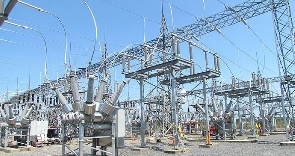 File photo of a modern substation
File photo of a modern substation
The energy sector is facing severe financial challenges, with government struggling to maintain power generation and ensure sector stability, say experts.
Energy consultant Dr. Nii Darko Asante, speaking at the 13th Ghana Economic Forum (GEF) in Accra, highlighted the sector’s escalating financial burden and increasing reluctance of investors to engage with it.
Dr. Asante noted that the country’s energy sector is “taking on water” financially, with the Minister of Finance needing to secure GH¢200million each month to support energy sector agencies.
He added that this financial strain is further compounded by the need to secure an additional US$16million monthly to pay for gas used in power generation. Despite these efforts, the sector’s debt continues to rise – posing a significant threat to its long-term sustainability.
He noted that between 2019 and 2021 government spent approximately US$5billion to address the sector’s growing debt. However, these payments have not stopped the rise of debt, creating an unsustainable financial cycle.
Dr. Asante noted that while investment opportunities exist, potential investors remain hesitant due to uncertainties about payment guarantees. He pointed out the challenges faced by Independent Power Producers (IPPs), who have struggled to receive timely payments for the power they supply to the national grid.
He said this uncertainty dampens investor confidence, making it even more difficult to attract much-needed capital to the sector.
“The reality is that we are in a precarious situation,” cautioned Dr. Asante, who was a panellist during the energy session of GEF24.
Dr. Asante specifically criticied the inefficiency of sector companies, citing the Electricity Company of Ghana (ECG) as an example. He noted that ECG is losing money it should be collecting, with estimated losses around 30 percent.
“Financial strain on the sector is immense, and until we address these underlying issues we risk undermining the stability of our energy supply,” he lamented.
The energy sector’s financial troubles come at a critical time as the country seeks to expand its energy capacity to meet growing demand and support economic development.
Fellow discussant on the energy panel, Sydney Nii Ayitey Tetteh, also acknowledged the impact of legacy debt and its buildup, stating: “It is difficult to convince any potential investor to put money into a sector with so many uncertainties”.
However, he noted that the energy sector recovery programme’s introduction is a positive sign of how the sector could have fully recovered if it had been implemented thoroughly. He also mentioned the cash waterfall mechanism that was put in place to address payment issues.
He suggested that certain specific actions must be taken to improve the sector, enhance its creditworthiness and encourage financial support.
“There is so much money out there willing to come in, but the fundamentals must be right,” he added.
Dr. Charles Gyamfi Ofori, Policy Lead for Climate Change and Energy Transition at the Africa Centre for Energy Policy (ACEP) who also participated in the session, discussed strategies to tackle power-theft, technical and commercial losses.
He noted that government is continually allocating funds to address these issues within the sector.
He explained that challenges within the power sector extend beyond investment issues to inefficiencies in managing the sector.
“It is also important to note that revenue generation relies on the distribution sector,” he said, adding that the losses cause significant inconvenience.
To turn things around, he among other things entreated authorities to deal with core managerial inefficiencies as against increasing tariffs to cover the cost and revenue losses being realised.
Also speaking at the Forum, Minister of State at the Ministry of Energy Herbert Krapa announced government’s renewed commitment to re-engineering the country’s economic model, with a focus on harnessing the energy sector’s potential to drive sustainable development.
The minister maintained that Ghana has made significant economic strides in recent decades, but to ensure a prosperous future “we must strategically shift our focus, particularly in the energy sector”.
“Energy is the lifeblood of any economy, and addressing the challenges and seizing opportunities within this sector are essential for our nation’s progress,” he added.
The current energy mix comprises hydroelectric power, thermal power and an increasing share of renewable energy sources such as solar and biomass.
The country boasts an electricity access rate of 88.85 percent, one of the highest in sub-Saharan Africa, and has made progress in improving energy reliability to support industrial growth.
However, the minister noted ongoing challenges – particularly in the areas of affordability and environmental sustainability. “Energy security is crucial for our development. Without reliable and affordable energy, our industries cannot thrive and essential services like education and healthcare will suffer,” he concluded.